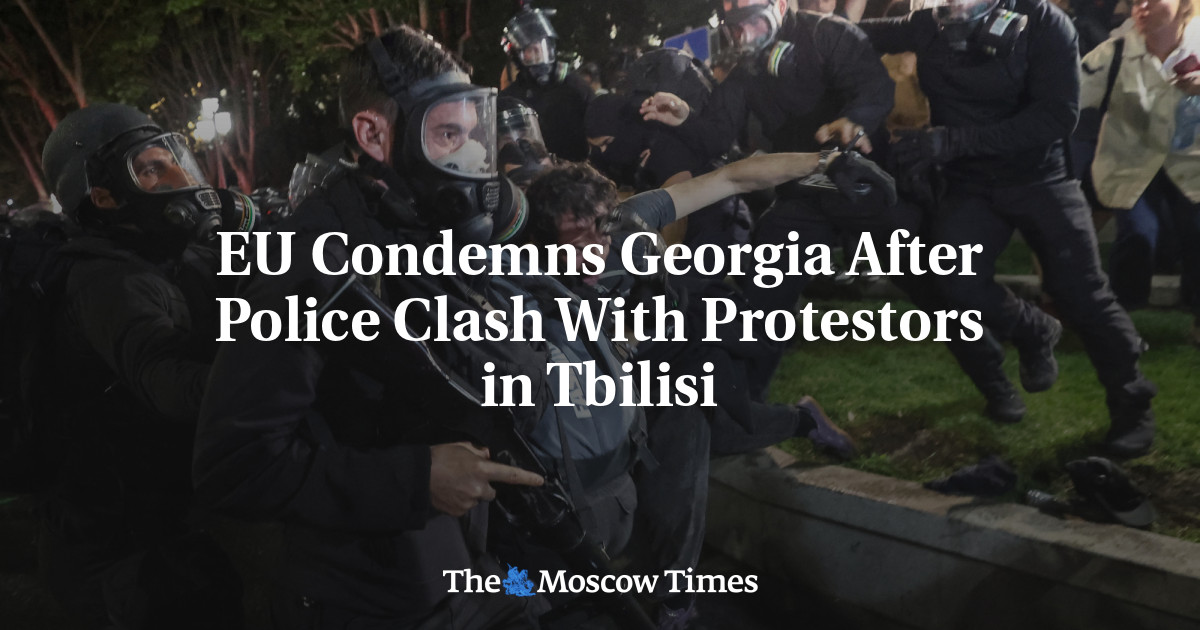
The European Union led condemnation against Georgia on Wednesday after police the night before fired tear gas and rubber bullets at demonstrators protesting against a controversial “foreign influence” bill.
The clashes were the most violent yet in the three weeks since rallies first began against the bill, which critics say resembles legislation used to crackdown on media and NGOs in Russia, while the EU has warned its passing could undermine Georgia’s ambitions to join the European Union.
Several people, including opposition politicians, were reportedly beaten by riot police at the latest rally, which went into the early hours of Wednesday. Georgia’s Interior Ministry said 63 people were arrested.
The turmoil came ahead of parliamentary elections in October, seen as a test of democracy in Georgia, three decades after it gained independence with the fall of the Soviet Union.
“I strongly condemn the violence against protesters in Georgia who were peacefully demonstrating against the law on foreign influence,” EU foreign policy chief Josep Borrell said Wednesday.
“Georgia is an EU candidate country, I call on its authorities to ensure the right to peaceful assembly. Use of force to suppress it is unacceptable,” he wrote on X (formerly Twitter).
‘Cruelly beaten’
An AFP reporter saw masked riot police violently rush toward the peaceful rally, which started Tuesday evening. They fired tear gas, rubber bullets and water cannons, beating and arresting scores of demonstrators.
Several journalists were attacked, including an AFP photographer who was wearing press identification.
Lawmaker Levan Khabeishvili, chairman of the main opposition United National Movement of jailed ex-president Mikheil Saakashvili, was badly beaten and had to seek medical help.
He appeared in parliament on Wednesday with a swollen face and a bandage across his nose and hand. TV stations aired footage showing his face disfigured with missing teeth.
Another Saakashvili ally, Sophia Japaridze, said she was “cruelly beaten by police.”
President Salome Zurabishvili, who has for years been at loggerheads with the ruling Georgian Dream party, also condemned the police crackdown and called on police to stop “the use of disproportionate force, the violence against barehanded youth.”
The country’s rights ombudsman called for an investigation into the use of “disproportionate force” against protesters and journalists.
Demonstrators blocked traffic outside parliament on Rustaveli Avenue, Tbilisi’s main thoroughfare, and several other key roads across the city.
The interior ministry said 63 demonstrators were arrested for “disobeying police and petty hooliganism.” It added that police used “legitimate force” only after the protest had “turned violent and demonstrators entered in a verbal and physical confrontation with law enforcement.”
Protestors are expected to gather again on Wednesday night.
‘Russian law’
“They are scared because they see our resolve,” one protester, 21-year-old Natia Gabisonia, told AFP. “We will not let them pass this Russian law and bury our European future.”
The bill, currently in its second reading, needs to pass three votes in parliament. President Zurabishvili is expected to veto the measure, but the ruling party has enough votes to override it.
If adopted, the law would require that any independent NGO and media organization receiving more than 20% of its funding from abroad register as an “organization pursuing the interests of a foreign power.”
Last year, mass street protests forced Georgian Dream to scrap its plans for similar legislation.
In a rare public appearance this week, billionaire Bidzina Ivanishvili, who chairs Georgian Dream and is widely believed to be the key power broker in Georgia politics, said the bill would aim to increase the transparency of foreign funding for civil groups.
“Non-transparent funding of NGOs is the main instrument for the appointment of a Georgian government from abroad,” he said at a pro-government rally.
Georgia has sought for years to deepen ties with the West, but Georgian Dream has been accused of attempting to steer the former Soviet republic closer to Russia.
In December, the EU granted Georgia official candidate status but said Tbilisi would have to reform its judicial and electoral systems, reduce political polarization, improve press freedom, and curtail the power of oligarchs before membership talks are formally launched.